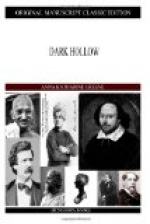“The police have listened to him. Mr. Andrews, who is one of the gentlemen present, has heard his story and you see that he stands here silent, my son. And that is not all. Mrs. Scoville, who has loved you like a mother, longs to believe in your innocence, and cannot.”
A low cry from the hall.
It died away unheeded.
“And Mr. Black, her husband’s counsel,” continued the father, in the firm, low tones of one who for many long days and nights had schooled himself for the duty of this hour, “shares her feeling. He has tried not to; but he does. They have found evidences—you know them; proofs which might not have amounted to much had it not been for the one mischievous fact which has undermined public confidence and given point to these attacks. I refer to the life we have led and the barriers we have ourselves raised against our mutual intercourse. These have undone us. To the question, ’Why these barriers?’ I can find no answer but the one which ends this struggle. Succumbing myself, I ask you to do so also. Out of the past comes a voice—the voice of Algernon Etheridge, demanding vengeance for his untimely end. It will not be gainsaid. Not satisfied with the toll we have both paid in these years of suffering and repression,—unmindful of the hermit’s life I have led and of the heart disappointments you have borne, its cry for punishment remains insistent. Gentlemen—Hush! Oliver, it is for me to cry don’t now—John Scoville was a guilty man—a murderer and a thief—but he did not wield the stick which killed Algernon Etheridge. Another hand raised that. No, do not look at the boy. He is innocent! Look here! look here!’” And with one awful gesture, he stood still,—while horror rose like a wave and engulfed the room—choking back breath and speech from every living soul there, and making a silence more awful than any sound--or so they all felt, till his voice rose again and they heard—
“You have trusted to appearances; you must trust now to my word. I am the guilty man, not Scoville, and not Oliver, though Oliver may have been in the ravine that night and even handled the bludgeon I found at my feet in the recesses of Dark Hollow.”
Then consternation spoke, and muttered cries were heard of “Madness! It is not we who are needed here but a physician!” and dominating all, the ringing shout:
“You cannot save me so, father. I hated Etheridge and I slew him. Gentlemen,” he prayed in his agony, coming close into their midst, “do not be misled for a moment by a father’s devotion.”
His lifted head, his flashing eye, drew every look. Honour confronted them in a countenance from which all reserve had melted away. No guilt showed there; he stood among them, a heroic figure.




